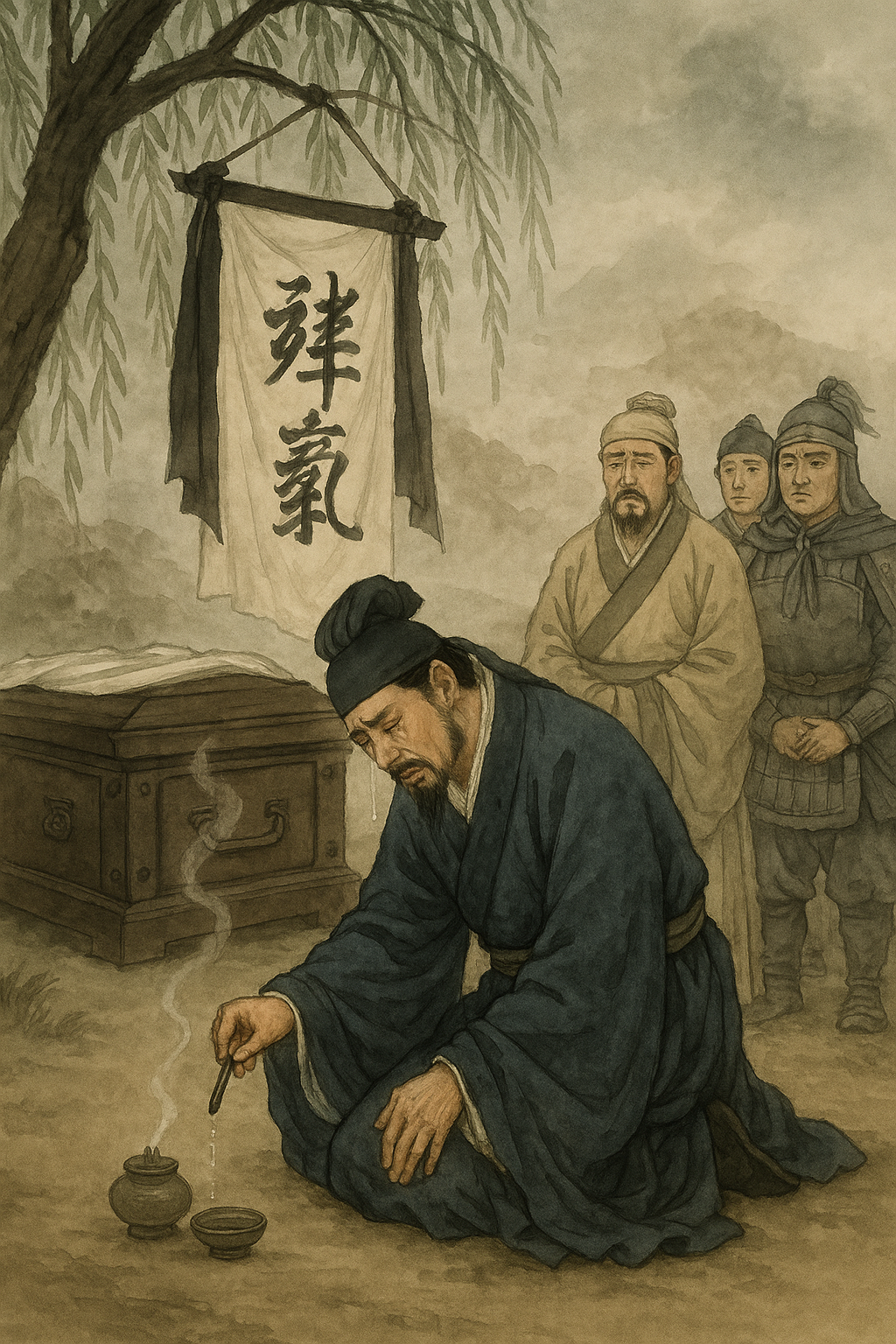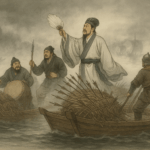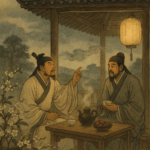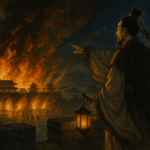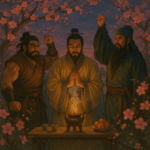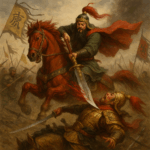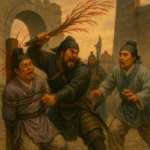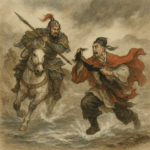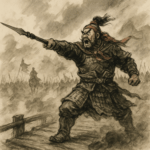Furious beyond measure, Zhou Yu tumbled from his horse at Chaisang Ford. His officers dragged him back to the flagship, where under heavy guard he was tended until he recovered consciousness. Rumor among the soldiers had it, “Liu Bei and Zhuge Liang are feasting and drinking atop the nearby hill!” Enraged at the news, Zhou Yu ground his teeth and swore, “If I cannot seize Yi Province, then I will die trying!” As he raged, a messenger arrived from Sun Quan bearing an order for his younger brother, Sun Yu, to join him. Sun Yu rode straight into Zhou Yu’s presence and declared, “By my brother’s command I am here to assist you.” He at once urged the army onward.
By the time they reached Baqiu, scouts reported that Liu Bei’s sons Liu Feng and Guan Ping had led troops upriver to block the approach. Zhou Yu’s anger burned hotter still—but then another courier arrived bearing a missive from Zhuge Liang. Zhou Yu tore it open and read:
To General Zhou Gongjin, Grand Commander of Eastern Wu:
It has been too long since we parted at Chaisang. I hear that you now plan a distant campaign to invade Yi Province. Forgive my boldness, but I believe such an enterprise cannot succeed. Though Liu Zhang of Yi is weak and idle, the rugged terrain and strong native population will hold him. To send troops thousands of li from home across perilous roads, only to claim the prize, would defy even the stratagems of Wu Qi and the tactics of Sun Wu. Meanwhile, Cao Cao broods ever on avenging Red Cliffs—if he seized upon our absence, Jiangnan would be laid to ruin. I could not sit idly by and watch. I therefore send this warning; may you heed it well.
Zhou Yu let out a long, sorrowful sigh, then summoned his secretaries to draft a reply to Sun Quan. Gathering his captains, he said, “I have ever wished to serve my lord faithfully, but fate has decided otherwise. You must all continue to serve Sun Quan faithfully and realize the great future he envisions.” With those words, he lapsed into unconsciousness. When he awoke, he looked to heaven and sighed, “Born with Zhou Yu’s fate, why was Zhuge Liang ever born?” He called out his own name twice more and died at the age of thirty-six. A later poet lamented:
From Red Cliffs rose his fearless flame,
A youth renowned with valor’s name.
His songs and laughter still evoke
The bond of friendship and the shared cup’s oak.With mighty armies at his side,
He strove unbowed, he strove with pride.
At Baqiu’s ford he met his end—
We stand and weep, our hearts to rend.
The generals kept Zhou Yu’s farewell letter sealed and dispatched it swiftly to Sun Quan. Upon reading it, the king wept openly. The letter read, in essence:
By humble birth I was lifted high;
You entrusted me with your forces—how could I fail?
Yet Heaven ordains our span, and my time was cut short.
Unwilling though I was to leave unfinished business,
my loyal friend Lu Su stands ready to take my place.Cao Cao still looms to the north, and Liu Bei dwells in Jingzhou like a tamed tiger.
Our realm is far from secure; this is a moment for urgent counsel.
Lu Su is upright and steadfast—trust him as you once trusted me.
So long as you heed his words, Zhou Yu’s name shall not perish.
Sun Quan read and mourned: “Gongjin had the talent to be a king’s right hand. Now that he has gone so suddenly, on whom can I rely? Yet he has named Lu Su as his successor—I cannot refuse his dying wish.” He immediately installed Lu Su as Grand Commander, put him in charge of all military affairs, and arranged for Zhou Yu’s funeral carriage to return to Chaisang for burial.
Meanwhile, in Jingzhou, Zhuge Liang studied the stars by night and saw a guiding star fall—he smiled and said, “Zhou Yu has died.” At dawn he informed Liu Bei, who sent scouts to confirm the news: sure enough, Zhou Yu was no more. Liu Bei asked Zhuge Liang, “With Zhou Yu dead, what should we do next?” Zhuge Liang replied, “The man Sun Quan appointed to succeed him is certainly Lu Su. The heavens have shifted to the east; under the pretext of mourning, I shall journey to Wu and call for able men to aid Your Highness.” Liu Bei hesitated: “I fear the officers of Wu might harm you.” Zhuge Liang answered, “When Zhou Yu lived, I did not fear him—now that he is gone, why should I fear anyone?” He summoned Zhao Yun and five hundred troops, prepared the mourning rites, and took ship for Baqiu to pay respects.
On the road he learned that Sun Quan had indeed invested Lu Su as Grand Commander and had sent Zhou Yu’s funeral team back to Chaisang. At Chaisang, Lu Su formally received him and paid the proper courtesies. Many of Zhou Yu’s former subordinates had wanted to kill Zhuge Liang out of old grudges, but at the sight of Zhao Yun’s sword-armored guard they dared not move. Zhuge Liang set up an altar before the bier, offered wine, and knelt to recite his eulogy:
Ah, Gongjin—your life was cut so short!
Fate’s scales weighed heavy, and none can fail.
My heart aches as I pour this cup—
May your spirit partake of this offering.Young you studied with noble Confucian elders,
Upheld virtue to help the common man.
At twenty you soared like a thousand-li roc,
Rising to found your realm in Jiangnan.
In prime of life you commanded these shores
And struck down rebels without fear.
Your marriage to the Little Qiao
Linked Han and Wu in mutual respect.
As son-in-law to the Liu dynasty,
You bore no shame among the court.You counseled boldly, resisted unworthy suitors,
First poised to rest your wings, then soared again.
At Poyang Lake you bested Jiang Gan’s schemes,
Your calm resolve and lofty ambition unmatched.
Your brilliant intellect guided war and peace,
Your fire-attack shattered enemies’ lines.Once you stood with heroic bearing—
Now your passing stains the earth with tears.
Your loyal heart and noble spirit
Won fame that death shall never dim.The heavens grow dark, the armies lament—
Our lord weeps for you, his faithful friend.
I, poor though I be, beg still to aid
The alliance you forged.How could Your Highness live without sorrow?
How could your loyal ministers bear their grief?
I, too, shall mourn until my bones grow cold.
May my humble words reach your spirit—
So that one day, when no friend remains,
You know my heart stands true.
Farewell, Gongjin—life and death divide us,
but your memory shall guide me ever on.From this day forth, no one will know you as I knew you.
The heavens and earth shall keep vigil on your name.
Farewell, in sorrow I leave this offering.
Having laid down his brush, Zhuge Liang wept openly, his tears like a spring. The assembled officers murmured, “Though people said Zhou Yu and Zhuge Liang were rivals, such grief surely speaks of true friendship.” Lu Su, moved by the sincerity of the tribute, reflected, “No wonder Zhuge Liang outshone even Gongjin in loyalty. It was Gongjin’s own narrowness that led to his death.” A later poet wrote:
The Sleeping Dragon woke to Southern clouds,
His light now added to Gongjin’s shroud.
Heaven gave us Gongjin’s kingly grace—
Why must mortals prize the Dragon’s face?
Lu Su hosted a banquet in Zhuge Liang’s honor. When it was time to depart, a scholar in black robes and a bamboo hat seized Zhuge Liang’s hand with a laugh: “You angered Zhou Lang to death, yet you come now to weep—do you think Wu has no one to stop you?” Zhuge Liang stared in surprise and recognized Fengchu—Pang Tong. The two laughed and boarded the boat together, exchanging confidences. Before parting, Zhuge Liang pressed upon him a letter: “I fear Sun Quan will never make full use of your talents. Should you find yourself dissatisfied, come to Jingzhou and help Lord Liu. He is broad-minded and will value you as he did me.” Pang Tong promised and departed; Zhuge Liang returned to Jingzhou.
Meanwhile, Lu Su escorted Zhou Yu’s coffin to Wuhu, where Sun Quan met them in mourning and ordered an honorable burial in Gongjin’s native land. Zhou Yu left behind two sons and a daughter; Sun Quan provided generously for them. Lu Su declared, “I am unworthy of such trust. Let me recommend one great man to assist our lord—a man whose knowledge spans heaven and earth, whose counsel rivals Guan and Yue. Zhou Yu trusted his words, and I likewise.” Sun Quan was delighted and asked, “Who is this man?” Lu Su replied, “He is Pang Tong of Xiangyang, styled Shiyuan, known as the Phoenix Chick.” Sun Quan said, “I have long heard of him—summon him at once.”
Lu Su invited Pang Tong to the palace. On seeing him—thick brows, broad nose, black beard—Sun Quan felt no warmth. He asked, “Your learning and skill—what do you excel in?” Pang Tong answered, “I adapt to circumstances without rigid rule.” Sun Quan continued, “How do you compare to Zhou Yu?” Pang Tong smiled, “My talents differ from his.” Proud of his adopted brother, Sun Quan bristled at the slight and said, “Retire for now. Should I need you, I will summon you.” Pang Tong sighed and left. Lu Su urged again, but Sun Quan, scornful, refused. He said, “This man is a madman—what good is he?” Lu Su protested, “At Red Cliffs he devised the chain-boat strategy that won great fame!” Sun Quan waved him away.
Outside the hall, Lu Su lamented to Pang Tong, “I had no choice but to recommend you to Sun Quan. If he will not use you, what can I do?” Pang Tong bowed and said nothing. Lu Su pressed, “Would you not serve in Wu?” Pang Tong replied, “I intend to join Liu Bei.” Lu Su exclaimed, “You would be a pearl wasted—come to Jingzhou and serve our lord; he will value you highly.” Pang Tong agreed. “Then let me write your letter of introduction,” said Lu Su. Pang Tong: “It was only a jest before—but if you judge it best, so be it.” Lu Su wrote the letter and Pang Tong departed for Jingzhou.
Back in Jingzhou, scouts announced: “The famed scholar Pang Tong has arrived to offer his service.” Liu Bei, having long heard of his reputation, welcomed him at once. Pang Tong greeted him with a deep bow and did not mention Lu Su’s letter, saying simply: “I come at Your Highness’s call.” Liu Bei replied, “Jingzhou is now stable but I have no civil official to govern our counties. In Leiyang County, some distance to the northeast, the magistrate has just retired. If you will take that post, I shall reserve further office for you later.” Pang Tong felt slighted, but with no one else present he could not press the issue. He bid the court farewell and departed.
At Leiyang’s yamen, Pang Tong made little effort to administer justice. He spent his days drinking, ignored petitions and taxes, and held no hearings. The locals sent word to Liu Bei: “The county magistrate does nothing but drink!” Liu Bei, enraged, summoned Zhang Fei and said, “Set out for Leiyang. If this man truly neglects his duties, you must investigate and punish him.” Zhang Fei and Sun Qian rode there. The townspeople welcomed them—but the magistrate was nowhere to be seen. Zhang Fei demanded, “Where is Pang Tong?” They answered, “Since his arrival over a hundred days ago, he has done no work save drink. Today he still lies in his cups.” Zhang Fei, furious, vowed to arrest him. Sun Qian interjected, “Sir, he is a man of genius—do not judge him lightly. Let us summon him to court, and if his conduct is improper we may punish him then.” Zhang Fei agreed.
Inside the yamen hall, Pang Tong at last appeared—hair disheveled, eyes bleary. Zhang Fei thundered, “Your Excellency was appointed by my lord; how dare you neglect your duties!” Pang Tong merely laughed, “What duties? This small county’s business is but trifles—sit down and watch me.” He summoned his clerks and had them bring every pending case from the past hundred days. Sitting high on his dais, he read each memorial, weighed each testimony, and rendered clear judgments without hesitation or error. The prisoners and petitioners knelt by the tiers, weeping and giving thanks.
By midday he had resolved every matter before him. He set down his brush and faced Zhang Fei: “Where are the duties I neglected? Cao Cao and Sun Quan I regard as mere spectators—how could this small county trouble me?” Zhang Fei, astonished, bowed deeply: “Sir, your talent is boundless—I have judged you unfairly. I shall enthusiastically recommend you to my lord.” Pang Tong then produced Lu Su’s letter of introduction. Zhang Fei, surprised, asked, “Why did you not show it earlier?” Pang Tong replied, “Had I done so at once, I would seem to have pressed my recommendation.” Zhang Fei turned to Sun Qian, “We would have lost a great man if not for you.” They invited Pang Tong back to Jingzhou and reported his brilliance to Liu Bei.
Liu Bei was struck with regret: “To have treated such a man so poorly was my fault alone.” He read Lu Su’s letter, which said in essence:
Pang Tong is no mere county magistrate. Such talent deserves political office where he may show his full wings. To judge him by his appearance is a grave waste—his abilities will serve nations yet to come.
Just then Zhuge Liang returned. Liu Bei asked, “Has Master Pang been well?” Zhuge Liang laughed, “He is too great a man for a minor county—he grows bored of petty affairs and seeks higher tasks.” Liu Bei admitted, “Were it not for your counsel, I would have lost a true genius.” He at once sent Zhang Fei to Leiyang with a formal summons. As Zhang Fei departed, Pang Tong was presenting Lu Su’s recommendation to the magistrate’s clerks. When news arrived of Liu Bei’s letter, Pang Tong read:
When the Phoenix Chick arrives, his talents must be used at once.
As Sima said, ‘To secure the realm, one needs either the Crouching Dragon or the Phoenix Chick—having both, the Han will rise again.’
Liu Bei exclaimed, “When Sima Zhao spoke these words, he foresaw this day. Now that I have both, the Han shall be restored!” He appointed Pang Tong as Deputy Colonel of the Imperial Cavalry, to serve alongside Zhuge Liang in planning and training the troops.
Before long word reached Xu Chang that Liu Bei, with Zhuge Liang and Pang Tong advising him, was mustering armies, stockpiling grain, and forging an alliance with Eastern Wu—in short, preparing to march north. Alarmed, Cao Cao called his own strategists together. Xun You advised, “With Zhou Yu newly dead, strike at Sun Quan first, then turn on Liu Bei.” Cao Cao replied, “If I campaign far afield, what if Ma Teng’s cavalry raid Xu Chang in my absence? At Red Cliffs the rumor of Xiliang invasion spread panic—I cannot risk it.” Xun You offered, “Then summon Ma Teng as General Who Conquers the South to lead forces against Sun Quan, draw him into the capital under pretense of alliance, and remove him. If Ma Teng falls, no threat remains in the south.” Cao Cao joyfully adopted this plan and dispatched the imperial rescript to Xiliang summoning Ma Teng.
Ma Teng—styled Shoucheng, grandson of General Ma Yuan—was a towering figure from the wilds of Longxi. His father Ma Su had served as county magistrate before falling on hard times among the Qiang, and his mother was Qiang. Ma Teng had risen to repel Qiang rebels and won promotion to General Who Conquers the West. On receiving Cao Cao’s summons, he and his eldest son Ma Chao discussed it: “We swore with Dong Cheng to restore the Han, yet Dong is dead and Liu Bei has been defeated. Now Jingzhou is secured by him, while Cao Cao calls for me—what should we do?” Ma Chao answered, “We cannot refuse the imperial summons—it would brand us rebels. We must go, but keep watch and seize our chance when it comes.” His nephew Ma Dai warned of Cao Cao’s treachery, but Ma Chao vowed to defend his father and make good on their vows. Ma Teng agreed, stipulating that Ma Chuo, Ma Xiu, and Ma Dai stay behind to guard Xiliang. Ma Chao: “I will stand with you against any who threaten the Han.” And so they set out.
Ma Teng led five thousand Xiliang troops south, sending advance guards under Ma Xiu and Ma Tie, and Ma Dai trailing as rearguard. Twenty li from Xu Chang they camped and awaited orders. Cao Cao, hearing of their arrival, sent Huang Kui to join them as military adviser, charged to tell Ma Teng: “Your province is distant and logistically strained; I will send further supplies and men. Tomorrow, present yourself at court, and I shall provide grain and equipment.” Kui rode out, drank with Ma Teng, and boldly denounced Cao Cao as a usurper. Ma Teng feared a trap and begged him to be cautious. Kui, emboldened by wine, revealed the full truth: “Cao Cao will have you parade before him, then destroy you.” Ma Teng vowed vengeance: “Tomorrow, at the troop review outside the city, we will slay him and right the realm!” The two agreed.
That night, Huang Kui’s mistress Li Chunxiang—who had an affair with his brother Miao Ze—plotted her own scheme. She encouraged Ze to bait Kui: “Ask him why he hates his lord.” When Kui arrived drunk at her chamber, she provoked him: “They say Liu Bei is virtuous and Cao Cao a villain—what do you think?” Kui, drunk and enraged, declared, “I hate Cao Cao and would kill him!” Ze reported this to Cao Cao. The next morning Cao Cao secretly ordered Cao Hong, Xu Chu, Xiahou Yuan, and Xu Huang to lie in wait—and arrested Kui’s entire household.
When Ma Teng arrived with his column at the red banner of the Chancellor’s command, he assumed it was Cao Cao reviewing his troops. Spurring forward, he was met by an ambush at the signal cannon. Cao Hong’s archers unleashed a storm of arrows; Xu Chu crashed in from one flank, Xiahou Yuan from another, and Xu Huang struck from behind, encircling Ma Teng. Caught unawares, Ma Teng’s army broke. Ma Tie was killed by arrows; Ma Xiu fought valiantly but was cut down wounded; Ma Teng and Ma Chao were captured. Huang Kui was paraded in chains and accused. Ma Teng raged, “A low scholar has ruined my campaign!” Cao Cao ordered their execution. A lamenting poet later wrote:
Father and son pledged their lives,
Their loyalty shone for all their tribe.
To end tyranny they gave their all—
Now stone and poem sound their fall.Their blood-bound oath still stands in verse,
A testament against foul curse.
Scion of Xiliang, unbowed in strife,
He follows Yuan’s footsteps in eternal life.
Huang Kui’s widow Li Chunxiang petitioned to marry him; Cao Cao scoffed, “You have destroyed your own sister’s family for your pleasures—why should you live?” He had Li Chunxiang, Miao Ze, and Huang Kui’s entire clan executed. The populace mourned in horror; a final poem scorned:
Miao Ze’s lust brought his sister’s shame,
Chunxiang’s schemes only sealed her name.
Even tyrants will not spare such sin—
Small-minded plots only end in ruin.
Cao Cao then mustered Xiliang’s surviving troops under a general pardon, posting guards at every pass to prevent Ma Dai’s escape. Yet Ma Dai, leading a thousand men, fled toward the northwest. Some returning soldiers warned him; he abandoned his men, donned simple clothes, and vanished into the night.
With Ma Teng and Ma Chao gone, Cao Cao resolved once again to march south. But word then reached him: “Liu Bei, with Zhuge Liang and Pang Tong, has been recruiting soldiers, stockpiling grain, and allying with Eastern Wu—he will soon launch a northern expedition.” Alarmed, Cao Cao exclaimed, “If Liu Bei secures Yi Province, how shall I contend with him?” Before he could finish, an adviser stepped forward: “I have a plan to pit Liu Bei against Sun Quan so that both east and west shall be ours.”
Which adviser it was, and what his strategy may be, we shall see in the next chapter.
